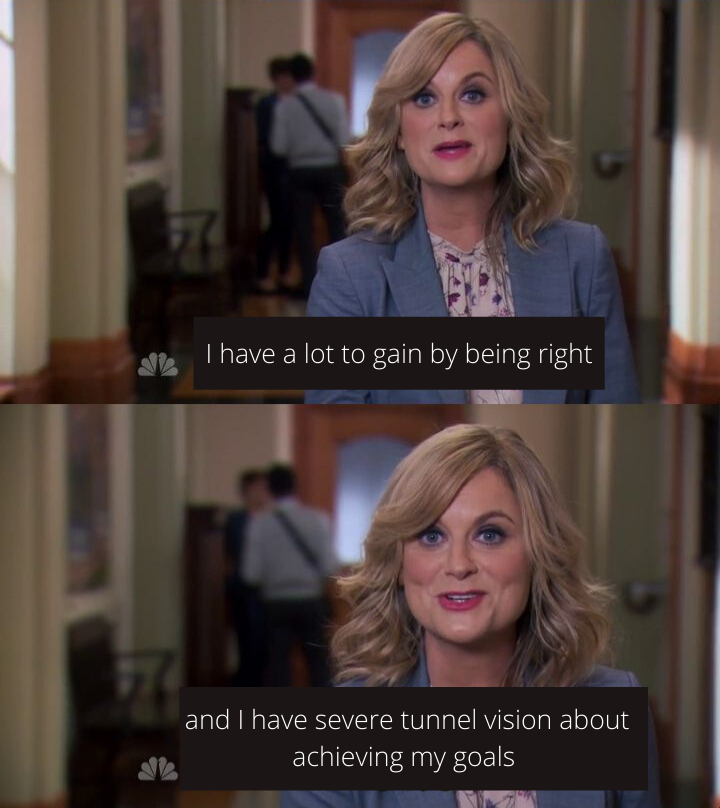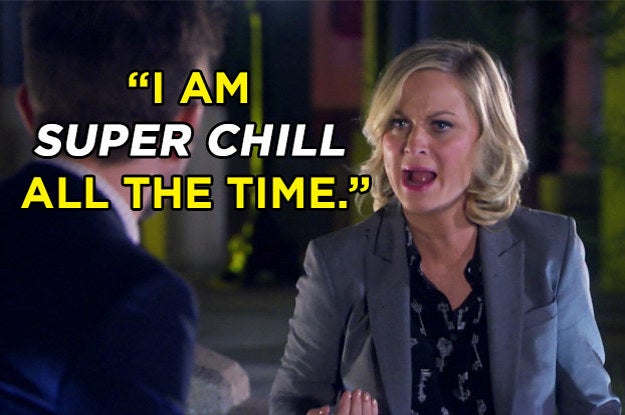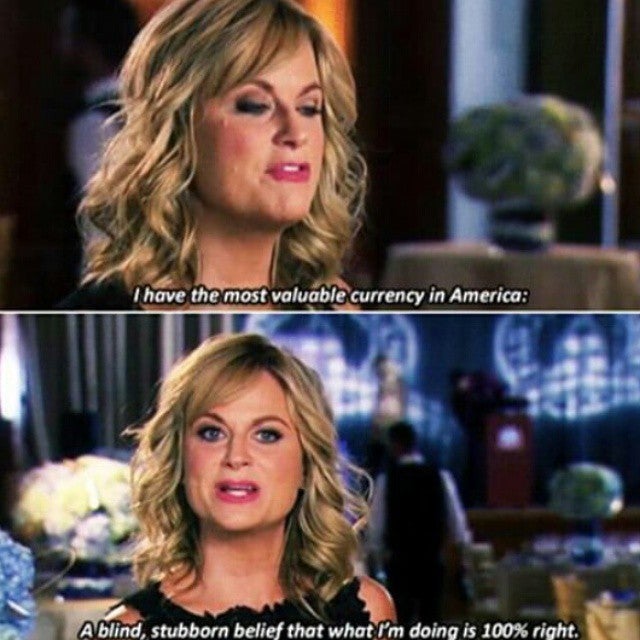Leslie Knope is Overrated: A Feminist Analysis
A reflection by WLRC graduate assistant Seth Quam

Leslie Knope, from the TV show Parks and Recreation, is a badass woman, a dedicated public servant, an outrageously hard worker, and an overall unstoppable force for good in the world. She makes heroic efforts consistently to make Pawnee a better place and to protect its citizens from infestations of raccoons, racist city councilors, corrupt corporations, and, in Leslie’s own words, “the human equivalent of gas station sushi, Jeremy Jamm.” With all that said, she is a bit overrated.
Throughout Parks and Rec’s first three seasons, there are numerous examples of Leslie’s extreme tunnel vision. Her extraordinary passion manifests itself in such a way that she has no regard for other people’s feelings or desires. She convinces Mark Brendanawicz to propose to her best friend, Ann Perkins, on live TV in order to boost the ratings for Leslie’s telethon fundraiser (S2 E22). She convinces Ann to go on a date with Chris Traeger in order to coerce him into adding more money for the parks and rec department budget (S3 E1). When the health department is looking for a new PR director, Leslie signs up Ann for an interview for the next day at 9am without even asking if she’d be interested in the job, and then is furious with Ann that she doesn’t spend all night cramming from the enormous interview prep binder that she prepared for her (S3 E13).
Leslie’s tendencies come to a climax in episode 8 of season 4, “Smallest Park.” At this point in the show, Leslie and Ben Wyatt have made their romantic feelings for each other very clear, but they can’t be together because of Chris’s rules that government employees should not be romantically involved with employees whom they supervise. As a result, Ben tells Leslie that after this last project, he is going to focus his attention away from the parks and rec department; his feelings for her really bum him out when he has to see her all the time at work. Ignoring what he wants, Leslie tries to drag on the project forever, tells him that he needs to spend more time with her instead of less, and then when Ben finally snaps and calls her a steamroller, she goes to Ann, incredulous that he could accuse her of such a thing. Here’s the exchange between Leslie and Ann:
LK: Everything in my life is going wrong right now. Whose fault is this? I demand to know.
AP: Actually
LK: (interrupting) Ben thinks that I’m a steamroller? That’s unbelievable! How dare he think that I’m a steamroller?
AP: Leslie, I’m just telling you this–
LK: (interrupting) I know he’s going through a phase right now and eventually we’re gonna both be friends again.
AP: No, what I was going to say is that you really are–
LK: (interrupting) working too hard. I know, Ann, you keep starting sentences and not finishing–
AP: (interrupting) You’re a steamroller! You’re a massive, enormous, runaway steamroller with no brakes and a cement brick on the gas pedal! You made me watch all eight Harry Potter movies! I don’t even like Harry Potter!
LK: That’s insane! You love Harry Potter. You’ve seen all eight movies!
AP: When we go out to a bar, you order my drinks for me!
LK: Because you order white wine and it gives you a headache!
AP: Well, it’s my headache! Leslie, you do what you want, you ignore what other people want, and you hear only what you want to hear.
LK: Ok. I know. I know I do this. I’m the worst.
AP: No, you’re very passionate. You just push too hard sometimes!
LK: Well then you should call me a bulldozer rather than a steamroller.
AP: (shaking head incredulously)
LK: I’m sorry.
AP: It’s gonna be okay.
LK: Is it? Honestly, is it? I mean I guess I just need to leave Ben alone. That’s what he says he wants.
AP: (nods in agreement)
Finally, Ann has gotten through to her, and Leslie has realized the error of her ways. She goes to Ben, apologizes, and legitimately asks him what he wants. This is such a great opportunity for Leslie to grow as a person, to dial back her passion just enough to realize how her actions affect others, and to give back some autonomy to the people closest to her.
Leslie Knope, part 2

So, she gets better after that point, right? Well, not really. In the next season, when Ann confides in Leslie that she wants to find a sperm donor, Leslie thinks that she’s not ready to make that decision and does everything she can to prevent it (S5 E12). When Ann decides that she and Chris are going to move to Michigan to start their family, Leslie throws a fit as if Ann is betraying their friendship (S6 E4). Then she throws an impromptu Galentine’s Day brunch with her other female friends, taking notes and ranking them in order to try to find a suitable replacement for Ann (S6 E17). She tries to bully Ben (now city manager) to discipline a vendor at the farmers market for lewd dancing in an attempt to sell chard (S6 E12). After Leslie is recalled from city council, she comes up with the idea to run again to steal Councilman Dexhart’s district (S6 E10). Of course, that would mean she and Ben would have to move to his district and spend 51% of their time there. She asks Ben what he thinks, he says it’s a terrible idea, then she asks the whole parks and rec gang, and none of them react favorably. Ben has to pay $1,200 to hire political consultant Jen Barkley for one hour to tell Leslie that she should dream bigger!
Leslie Knope, part 3

The final season of Parks and Rec reveals a feud between Leslie and Ron. I’ll give Leslie a pass for her stubbornness in this because if Ron just had even a teaspoon of emotional communication skills, the whole thing could’ve been avoided. However, in “Ms. Ludgate-Dwyer Goes to Washington” (S7 E8), April is terrified to tell Leslie that she maybe doesn’t want to work in government anymore. Leslie only exacerbates her anxiety by revealing a giant binder, a meticulous five-year government career plan for April, and printed “Gov Buds For Life!” t-shirts. When April is drumming up the courage to confess to Leslie and looking completely uncomfortable, Leslie is oblivious and presents her with another updated five-year plan binder because they’re ahead of schedule! April finally breaks down and tells her that she doesn’t know if she wants to work in government. she says she is only in her job now because she fell into an internship at Parks and got swept up into Leslie’s vision for her. Leslie is shocked and horrified and walks out in disgust.
She then goes to complain about April to Madeleine Albright. Consider their conversation:
MA: Wow, Leslie. I haven’t seen you this upset since you almost forgot Ann’s half birthday.
LK: Yeah.
MA: Tell me, how many times have we had lunch?
LK: Five. Well, eight, if you count all those times I showed up unannounced at your office with mini muffins.
MA: And why have we had lunch so many times?
LK: Well, because, when I knew I would be coming to Washington to work, I wore you down until you agreed to become my friend.
MA: I’m so glad that you did, and you are a wonderful friend, but, sometimes, you’re so focused and driven you forget about people’s feelings.
LK: Ah, pfft! Name one time I’ve done that.
MA: Well, you were so wrapped up in your story that you actually ate my waffle.
It strikes me that this conversation is eerily similar to the talk she had with Ann years before. I think this is my chief complaint about Leslie–she doesn’t really grow very much throughout the series. At best, she mellows out a tiny bit. This is why I like some of the other characters a bit more: Andy, April, Chris, and even Ben all have a lot more growth than Leslie seems to.
It seems to me that this tunnel vision, this “I know what I’m doing is right and no one can convince me otherwise,” is a hallmark of white feminist ideology. I certainly don’t want to appoint myself as the arbiter of what is or isn’t problematic feminism, but I still think it’s good to point out white feminism when it appears–and especially when it’s revered by lots of people in the way that Leslie is. Isn’t this tunnel vision the opposite of intersectionality? If intersectionality is about understanding that ways that multiple forms of oppression compound themselves to impact people differently, Leslie’s tunnel vision seems like it would prevent having an intersectional lens on seeing the world. Despite her overall good relationship with Wamapoke leader Ken Hotate, in the first episode of season 7, Leslie asks him if he would donate $88 million to help her buy a piece of land in the former Eagleton to preserve as a national park. Ken’s response: “So you would like the Wamapoke people to pay the federal government millions of dollars to buy land that was stolen from us by the federal government? And we don’t even get to keep the land?”
Her choice in role models reflects her ideology. She has long idolized Joe Biden, Madeleine Albright, and Hillary Clinton. Those three, like Leslie herself, have worked hard in their careers to make the world better, but their efforts have not been inclusive of populations who are most vulnerable or individuals who experience multiple forms of oppression.
To be clear, I really like Leslie. Despite everything I’ve said, I would love to be friends with her. Especially in a world where so many people aspire to be like Leslie, I think it’s important to point out some of her character flaws and the way that her steamroller tendencies can cause real harm.